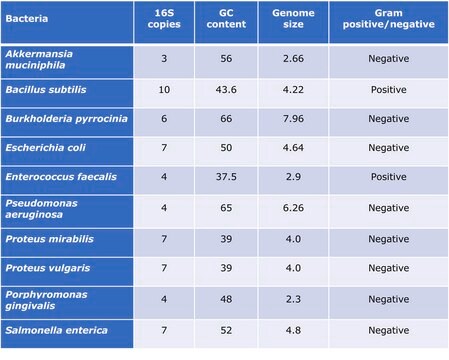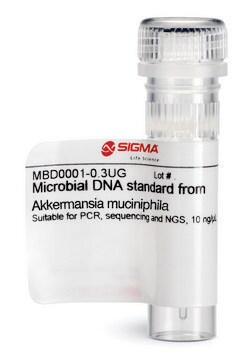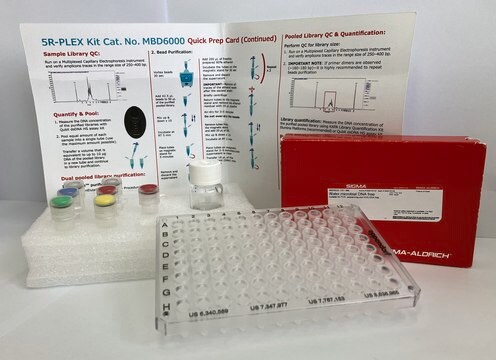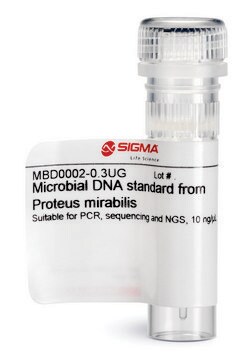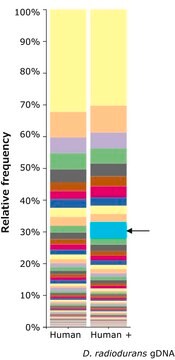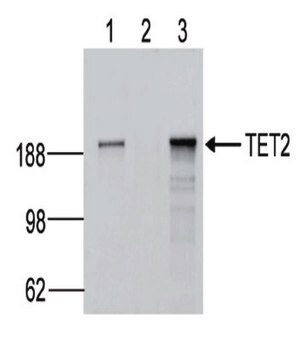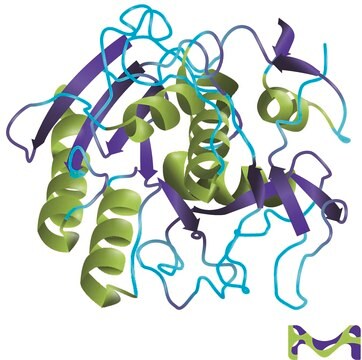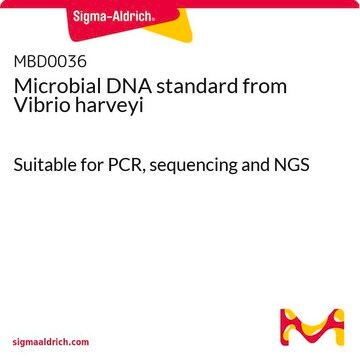MBD0003
Microbial DNA standard from Proteus vulgaris
Suitable for PCR, sequencing and NGS
Autenticatiper visualizzare i prezzi riservati alla tua organizzazione & contrattuali
About This Item
Codice UNSPSC:
12352200
NACRES:
NA.24
Prodotti consigliati
Livello qualitativo
Stato
liquid
Concentrazione
10 ng/μL
tecniche
DNA extraction: suitable
DNA sequencing: suitable
PCR: suitable
Condizioni di spedizione
ambient
Temperatura di conservazione
−20°C
Descrizione generale
Standardization of sample analysis is currently needed in microbiome genomics research workflow. Lack of standardization can lead to biases and errors in common processes during sample preparation and analysis such as sample amplification, sequencing and bioinformatics analyses.1 Proteus vulgaris genomic DNA microbial standard can serve as standard for benchmarking the performance along the workflow of microbiomics or meta-genomics analyses and as a tool to increase reproducibility and allow comparison of results obtained by different labs.
Proteus vulgaris is a rod-shaped gram negative, facultative anaerobe bacterium. It inhabits the intestinal tract of humans and animals and can be found in soil, water and feces.2 P. vulgaris is a member of Enterobacteriacea family that are opportunistic pathogens in humans, responsible for urinary tract and burn infections. 3 P. vulgaris was also observed fecal samples of healthy individuals. 4Read here how to use our standards to ensure data integrity for your microbiome research.
Applicazioni
Suitable for Quantitative standard for PCR, Sequencing and NGS
Caratteristiche e vantaggi
- Individual microbial standard for microbiomics and meta-genomics workflow
- Suitable standard for PCR, sequencing and NGS
- Improve Bioinformatics analyses
- Increases reproducibility
- Compare results lab to lab
Stato fisico
Liquid -The genomic DNA is provided at ≥10 ng/μl concentration in TE buffer pH 8.0
Codice della classe di stoccaggio
12 - Non Combustible Liquids
Classe di pericolosità dell'acqua (WGK)
WGK 1
Punto d’infiammabilità (°F)
Not applicable
Punto d’infiammabilità (°C)
Not applicable
Scegli una delle versioni più recenti:
Certificati d'analisi (COA)
Lot/Batch Number
Non trovi la versione di tuo interesse?
Se hai bisogno di una versione specifica, puoi cercare il certificato tramite il numero di lotto.
Possiedi già questo prodotto?
I documenti relativi ai prodotti acquistati recentemente sono disponibili nell’Archivio dei documenti.
Proteus vulgaris urinary tract infections in rats; treatment with nitrofuran derivatives
D. J. N. Hossack
British Journal of Pharmacology and Chemotherapy, 306-312 (1962)
Nerea Porres-Osante et al.
Microbial ecology, 70(1), 132-140 (2014-12-17)
The intestinal tract is a huge reservoir of Enterobacteriaceae, some of which are opportunist pathogens. Several genera of these bacteria harbour intrinsic antibiotic resistance genes, such as ampC genes in species of Citrobacter, Enterobacter or Escherichia genera. In this work
D C Morrison et al.
Annual review of medicine, 38, 417-432 (1987-01-01)
In this chapter, current concepts about the mechanisms of action of endotoxin are reviewed. Particular attention is focused upon endotoxin-induced production of soluble mediators from macrophages and mononuclear cells and on the potential contribution of these mediators to endotoxin shock.
J Paul Brooks et al.
BMC microbiology, 15, 66-66 (2015-04-17)
Characterizing microbial communities via next-generation sequencing is subject to a number of pitfalls involving sample processing. The observed community composition can be a severe distortion of the quantities of bacteria actually present in the microbiome, hampering analysis and threatening the
Il team dei nostri ricercatori vanta grande esperienza in tutte le aree della ricerca quali Life Science, scienza dei materiali, sintesi chimica, cromatografia, discipline analitiche, ecc..
Contatta l'Assistenza Tecnica.